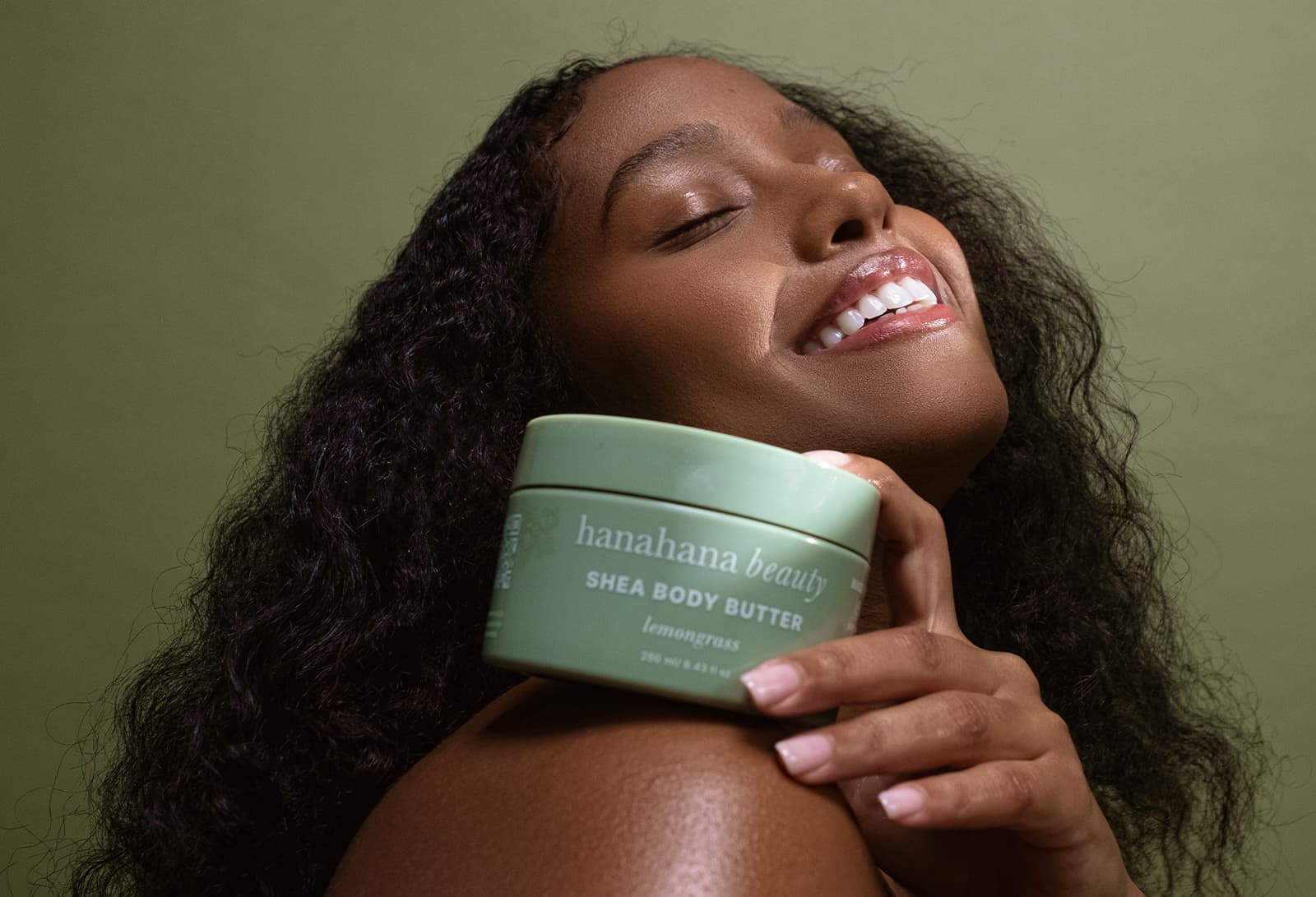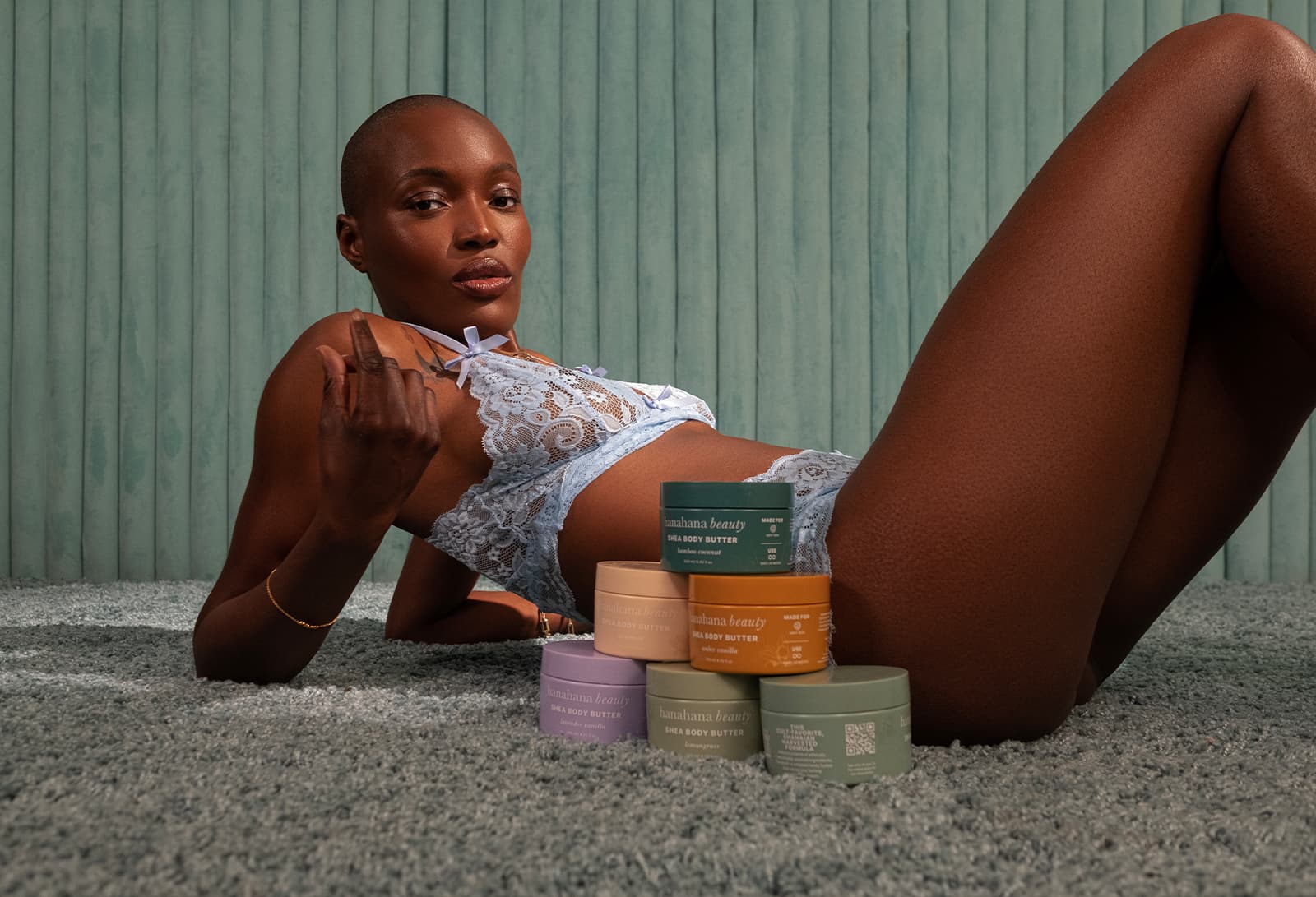In the beauty industry’s dynamic landscape, Ghanaian-American founder Abena Boamah-Acheampong is standing out as a trailblazer, not only for her innovative skincare brand, Hanahana Beauty, but also for her unwavering commitment to social impact in local communities in countries like Ghana. As the founder of Hanahana Beauty, Boamah-Acheampong is carving a niche by redefining beauty standards especially for the Black community, and promoting community building within the cosmetics sector.
With a "Stay Smooth, Don’t Be Ashy" brand slogan, Boamah-Acheampong’s journey into skincare began with a profound realization that there’s a need for inclusive, sustainable beauty products that celebrate diverse skin types. Drawing inspiration from her Ghanaian heritage, she founded Hanahana Beauty in 2017. The brand's products, ranging from scented and unscented shea body butters to oils, are made using natural ingredients sourced directly from women-led cooperatives in Ghana. By partnering with these cooperatives, Hanahana Beauty not only ensures the highest-quality indigenous ingredients, but also supports fair wages and economic empowerment for these women.
Recently, Boamah-Acheampong set out to raise $200,000 in customer equity. Although the brand achieved a significant milestone by raising $136,950, it demonstrated its strong connection with its community of supporters. This infusion of capital not only underscores the demand for Hanahana Beauty products but also the trust that customers have in the founder’s vision. Beyond customer support, Boamah-Acheampong has successfully attracted over $400,000 from investors, with a $2 million growth in sales alone since inception, speaking volumes about the potential of Hanahana Beauty to disrupt the beauty industry paradigm, and her entrepreneurial spirit that is grounded in a deep sense of social responsibility.
As the industry continues to evolve, Abena Boamah-Acheampong, through Hanahana Beauty, is exemplifying how business can be a force for positive change. Through her innovative approach to skincare and unwavering commitment to social impact, she is reshaping the beauty industry one product at a time, and empowering women along the way. In this exclusive profile, BeautyMatter delves into Abena Boamah-Acheampong's entrepreneurial vision, exploring the roots of Hanahana Beauty and the principles that drive its success.
It has been seven years since you founded Hanahana Beauty. How has the experience been for you?
It’s been a journey. It has definitely been a great experience that has allowed me to understand and hone skills of what it means to build community and build a brand that also partners with a multitude of different people including investors, producers, teams, and the women in Ghana. The experience has also been challenging, and I think that anything that’s good, successful, or impactful has to have challenging aspects to it.
However, overall, in the last seven years, I don’t think I have experienced any true regrets, as I believe that every one of those experiences has led me to where I am today. I say this all the time, but I do feel like my purpose is bigger than Hanahana. The brand helps to push my purpose forward, taking me into creative spaces where people can learn about themselves and the different things that can help them elevate themselves in their different ventures. As a product, we do that when it comes to skin, but overall, our mission and what we’re doing is a format of elevation for different people.
You started off as a math school teacher, and were even making plans to further your education up to a PhD level. When did that pivot from education to beauty happen?
When I was teaching in Chicago in 2014, I had started making products for myself. As I was making products and exploring that, I was learning more about the shea industry, understanding how shea was made, and I was very much intrigued by being able to see that process myself. It gave me a better understanding when I went back home to Ghana. December 2016 was when I made the decision that I would launch a brand and March of 2017 was when I officially launched the brand.
Again, I came into it with a very naive understanding that most people would actually raise money to launch a brand. I had just thought that I wanted to launch a brand because I want to be able to tell the story of the community that produces shea butter. In three months or more, I did the branding and put all the little things it required before launching it myself.
What have been some of your biggest learning experiences so far?
I think in every stage of Hanahana Beauty, I have had loads of different learning experiences. When it comes to investing in the last few years and fundraising, I have learned that to grow, you have to learn to pitch your brand to your customers for them to buy the products—whereas, I am now pitching to people to want to invest their money into their products. So, being able to know how to translate the Hanahana story to [pique people’s interest], and cause them to put a foot forward is one of the biggest lessons.
Also, there’s the understanding of what it means to fundraise and for people to have equity in your brand. I think that’s one thing that was exciting about bringing this opportunity to our customers. We had to do a lot of learning, looking at what it means to give up shares, what it means to give up equity, and what it means to go and build a brand to a point where you’re ranked enough to be acquired, and be able to teach that back to our customers.


Speaking of investments, what was your key to winning over investors and VC firms in such a competitive industry? What would you say differentiates your brand from the others currently stocked in the 500+ Ulta Beauty stores you’re stocked in?
I think for us it’s three things—the mission of the brand, the quality of the products, and how it speaks to community. While we tell the story of how we source, we also tell the stories of how we partner with the producers we work with. We talk about how we’re not only being able to pay twice the asking price for raw materials, but also how we’re creating access to healthcare for over 500 people, and just optimizing the living experience and quality of life of the people that we’re working with. That in itself is one part where people are looking to invest their money as a product with brands like us that are ethically sound.
Our products are top tier not only because of how we source shea, but also because we're being intentional about how we product develop. While we work with the Ghanaian artisans and community, we’re also working with a Ghanaian chemist that understands these raw ingredients, but is also science backed so products are result driven. At the end of the day, we have many brands now that speak to melanated skin, and we get to do that through our POV.
Your recent venture into using Hanahana Beauty to raise equity for your customers has been a very interesting one. For customers who may not be business savvy, could you discuss what this means for them?
Basically, we’re utilizing a SAFE [Simple Agreement for Future Equity] note. What it means is that investors, in this case, customers, are coming in early because they either believe in the founder or the work the brand is doing. Because they have invested early on, when there’s a trigger—either going into a Series A round when there’s a price put on shares or when there’s the sale of a brand—investors, customers in this case, would have access to shares based off of the valuation that they came in with, because they came in early.
It will allow customers who come in early to grow with us, before we even reach a much higher valuation, which would give them access to maybe discounts in the share price points, which is again calculated based on the valuation they came in with. What’s great about it and why we did it is because we’re looking to give opportunities to our customers to follow us to a place of even bigger value and profitability.
The fundraising ended on the 25th of April. Now that a lot more customers have gotten clarity from this, can they still get involved? Are there plans for them to still be involved?
If people are accredited investors and they’re interested, there is still opportunity to invest. However, this is sadly our only crowdfunding. It was our first, by the way. I don’t have plans to do another raise at this point in time. There are different opportunities to those who want to be a part of Hanahana through our impact work for example. We do have a nonprofit called the Hanahana Circle of Care (an initiative aimed at improving the economic, environmental, and self-sustainability of women of the shea trade), so we do constantly seek donations. For example, through the NPO, we’re currently looking to build a freshwater pipeline for the community.
It’s very interesting to learn this was your first crowdfunding campaign. What have been your biggest lessons?
You know, I really think that utilizing faith as a reflex is so important. Sometimes, being a founder comes with a lot of doubt. I think it’s always just important to put yourself out there. If there’s one thing I’ve learnt, it’s to not stay quiet and not live in the face of doubt, but really be out there and tell your brand story. I have really learned to not be scared to tell my story in a multitude of ways. This has also shown me that it also takes a couple of while to convert someone.
I think for anyone looking to go into WeFunder or crowdfunding campaigns, they need to realize that this is a marketing campaign as much as a crowdfunding campaign. So, they need to be as consistent with the marketing throughout the full time.